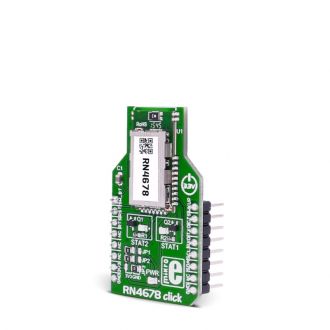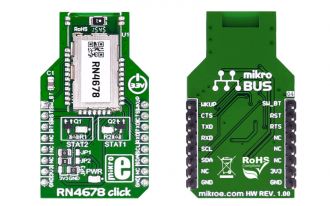
We strongly encourage users to use Package manager for sharing their code on Libstock website, because it boosts your efficiency and leaves the end user with no room for error. [more info]

Rating:
Author: MIKROE
Last Updated: 2019-08-01
Package Version: 1.0.0.1
mikroSDK Library: 1.0.0.0
Category: BT/BLE
Downloaded: 6578 times
Not followed.
License: MIT license
RN4678 click carries the RN4678 Bluetooth® 4.2 dual mode module from Microchip. The click is designed to run on a 3.3V power supply. It communicates with the target microcontroller over I2C and UART interface.
Do you want to subscribe in order to receive notifications regarding "RN4678 click" changes.
Do you want to unsubscribe in order to stop receiving notifications regarding "RN4678 click" changes.
Do you want to report abuse regarding "RN4678 click".


Library Description
The library covers all the necessary functions to control RN4678 Click board.
Key functions:
void rn4678_writeByte( uint8_t input ) - Write Single Byte.uint8_t rn4678_byteReady() - Check for new byte received.uint8_t rn4678_readByte() - Read Single Byte.The application is composed of the three sections :
void applicationTask()
{
if ( devType == _RN4678_DEVICE_TYPE_MASTER )
{
rn4678_connect( &RN4678_ADDR_SLAVE1[ 0 ] );
rn4678_send( _RN4678_MTYPE_MSG, _RN4678_DTYPE_STRING, _RN4678_ID_SLAVE, &MESSAGE_DATA[ 0 ] );
mikrobus_logWrite( " Message Send ", _LOG_LINE );
rn4678_disconnect();
}
else
{
msgFlag = rn4678_read( &MESSAGE_DATA[ 0 ] );
if ( msgFlag == 1 )
{
mikrobus_logWrite( logText, _LOG_LINE );
}
}
}
Other mikroE Libraries used in the example:
UARTConversionAdditional notes and informations
Depending on the development board you are using, you may need USB UART click, USB UART 2 click or RS232 click to connect to your PC, for development systems with no UART to USB interface available on the board. The terminal available in all MikroElektronika compilers, or any other terminal application of your choice, can be used to read the message.